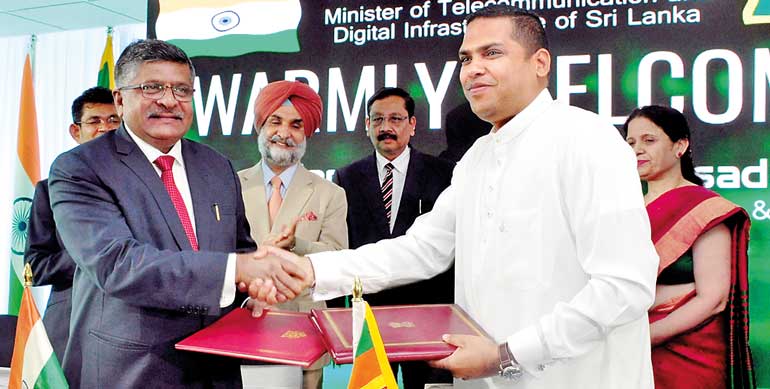Wednesday Feb 25, 2026
Wednesday Feb 25, 2026
Tuesday, 16 January 2018 00:29 - - {{hitsCtrl.values.hits}}
 India's Minister of Law and Justice, Electronics and IT Ravi Shankar Prasad and Telecommunication and Digital Infrastructure Minister Harin Fernando shake hands whilst exchanging the MoU signed yesterday - Pic by Lasantha Kumara
India's Minister of Law and Justice, Electronics and IT Ravi Shankar Prasad and Telecommunication and Digital Infrastructure Minister Harin Fernando shake hands whilst exchanging the MoU signed yesterday - Pic by Lasantha Kumara
The Government’s efforts to build a digital society got a big boost yesterday from IT-savvy India with the two countries launching multiple initiatives aimed at enhancing egovernance and academic research via greater collaboration.
The landmark development between the two friendly countries was witnessed by the visiting Minister of Law and Justice, Electronics and IT of India, Ravi Shankar Prasad, and Minister of Telecommunication and Digital Infrastructure Harin Fernando as well as academics and officials from the two countries linked via video conferencing.
The initiatives were a Memorandum of Understanding in the field of IT and Electronics, a Joint Declaration of Intent for a pilot project on E-Office suite developed by India and a partnership between India’s National Knowledge Network (NKN) and the Lanka Education and Research Network (LEARN).
Prasad noted India’s commitment to share the fruits of the ambitious Digital India program with the Government of Sri Lanka. He assured India’s fullest cooperation towards making Sri Lanka a digital inclusive nation. “We are here to assist Sri Lanka to innovate more, create more economic and job opportunities,” he said.
He underlined the importance of digital inclusion, the need to use IT to uplift the people at the grassroots level, and the need for the benefits of IT to percolate to those most in need of it. Referring to the eOffice solution, he said it meant more transparency and accountability and noted egovernance ensures faster governance.
The Minister also referred to his Prime Minister Narendra Modi’s overarching policy to make India a digitally empowered society and Sri Lanka was the first South Asia nation to which India has extended support via the initiatives inked yesterday.
“India will always be able to help Sri Lanka and I hope this pilot project becomes a powerful initiative for Sri Lanka’s efforts to create a digital society,” Minister Prasad added.
Minister Harin Fernando, having thanked India for the support, said there was scope for greater collaboration. He said the initiatives kicked off yesterday would further strengthen Sri Lanka’s ongoing efforts in accelerating IT and E-related governance and public service delivery for its strategic approach towards a digital economy. He said Sri Lanka can learn considerably from India’s Aadhaar, the biometric identification program and Unified Mobile Application for New-age Governance (UMANG) initiatives.
The MoU signed between the two ministries has identified several areas for future collaboration facilitated by the respective governments. They include egovernance, mgovernance, e-Public Services Delivery including e-learning, tele-medicine and cyber security.
The e-Office, an electronic platform developed by the National Informatics Centre of India (NIC), which enables the conduct of office procedures electronically, was launched in Sri Lanka. The E-office platform is widely used in Government offices in India and has transformed government functioning into a more efficient and transparent mode, removing the need for processing and storage of conventional paper files.
The knowledge partnership between NKN and LEARN will enable secure and reliable connectivity between the educational institutions of India and Sri Lanka under an Ultra High Bandwidth network. In a unique development, several universities in India and Sri Lanka were linked through a digital video conference during the launch. Sri Lankan universities will now be able to connect with educational institutions in Europe also through the network.
At the launch 16 Sri Lankan academic institutions of LEARN and six out of 1,600 Indian institutes were engaged via a video conferencing. Top educational institutions in India and Sri Lanka are now connected through NKN such as IIT, Delhi, IISC, Bengaluru, JIPMER, Puducherry, MSU and MKU from India and Open University, Jayewardenepura University, Ruhuna University, Jaffna University, Moratuwa University, Rajarata University and Eastern University from Sri Lanka.
The two countries will also promote B2B partnerships and collaboration between industry associations, developing digital talent and enhance digital/ICT literacy, cooperation R&D and innovation in the ICT sector between private and public institutions.
Minister Fernando urged private enterprises to benefit from these initiatives.
Ministry Secretary Wasantha Deshapriya, Foreign Secretary Prasad Kariyawasam, Indian High Commissioner Taranjit Singh Sandhu, NIC India Director General Neeta Verma, ICTA Chairperson Chitrangani Mubarak, Sri Lanka Telecom Chairman P.G. Kumarasinghe and industry leaders were also present at the event.